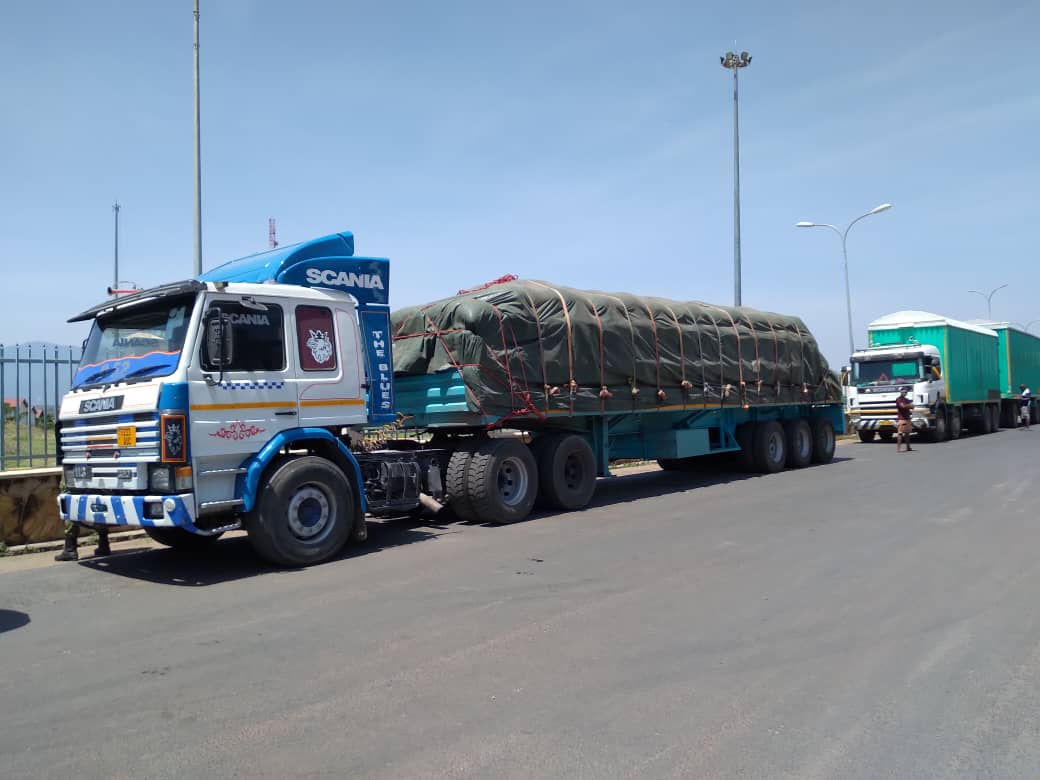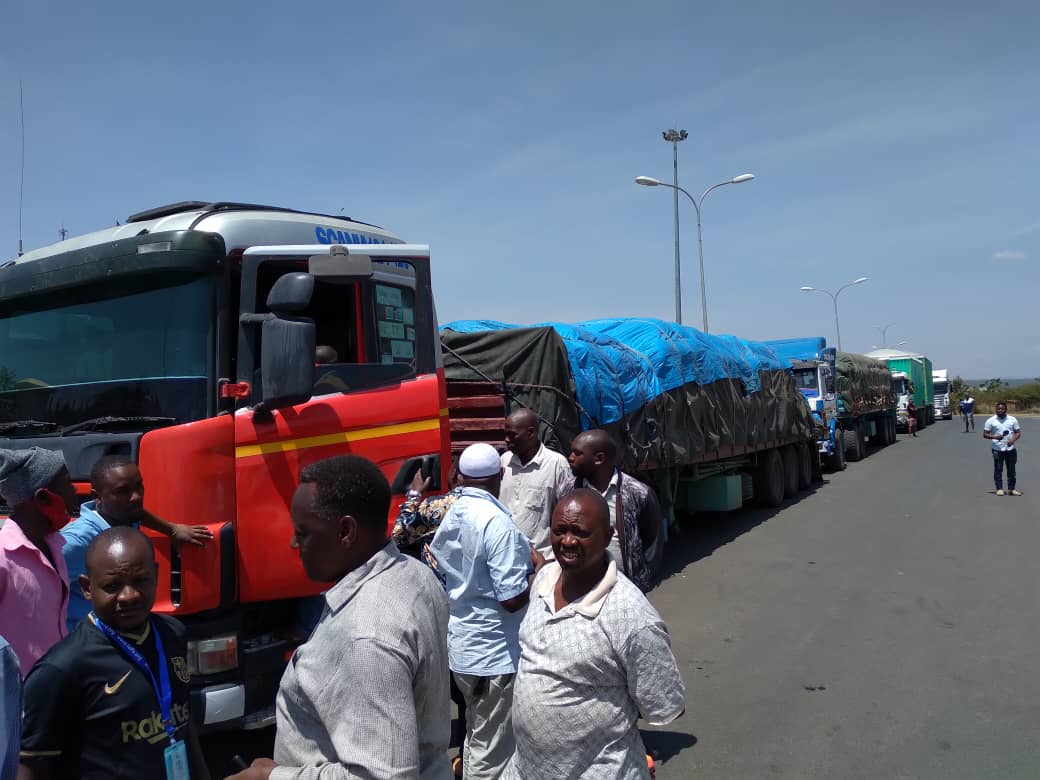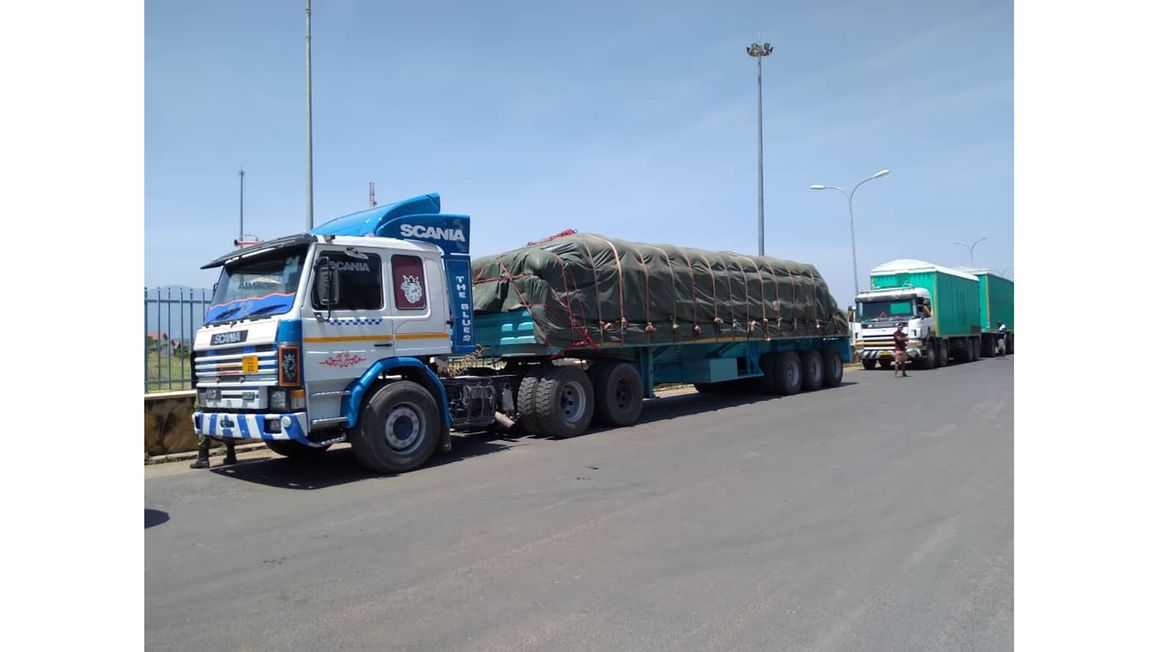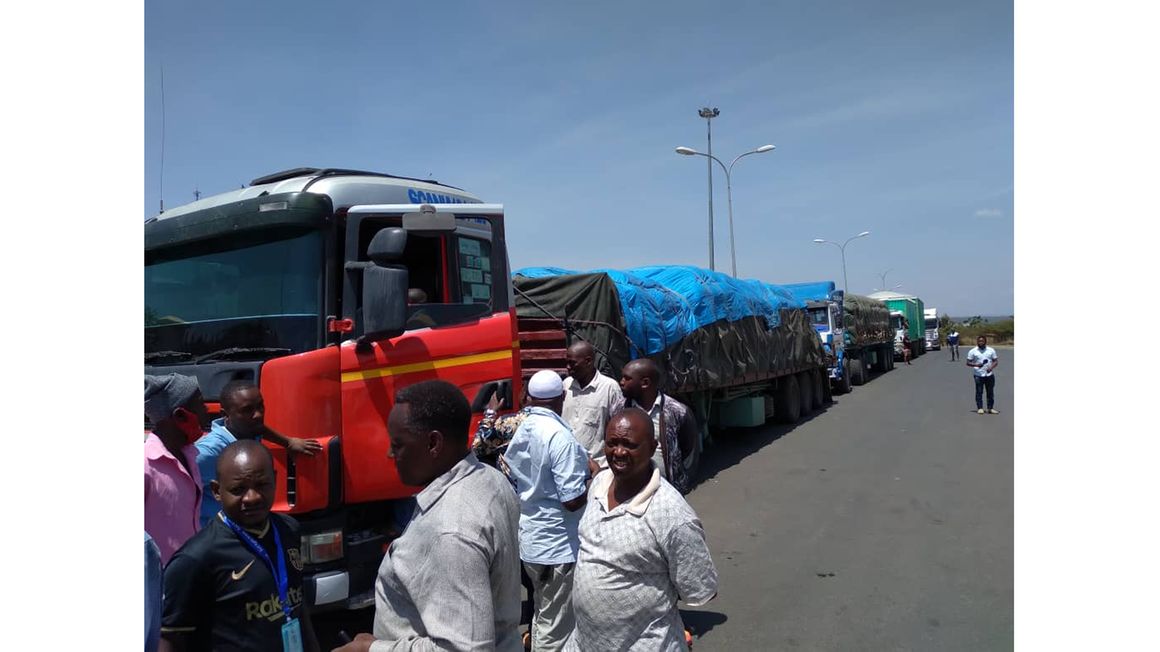Navigation
More options
You are using an out of date browser. It may not display this or other websites correctly.
You should upgrade or use an alternative browser.
You should upgrade or use an alternative browser.
Is Kenya's ban on maize from Tanzania and Uganda has anything to do with this directive?
- Thread starter Geza Ulole
- Start date
nguvusimba
JF-Expert Member
- Feb 17, 2020
- 1,117
- 1,827
Here is what Deputy Minister of Agriculture had to say!
Kenya bans maize imports from Tanzania and Uganda, Bashe calls for calm
SATURDAY MARCH 06 2021

Trucks loaded with maize from Tanzania parked at the Namanga border today. Photo| Filbert Rweyemamu
Summary
- While in Longido District today, the deputy minister of Agriculture Bashe said the Government of Tanzania is taking the ban of maize imports seriously.

By The Citizen Reporter
More by this Author
Kenya has with immediate effect banned the importation of maize from Tanzania and Uganda.
In a letter by the acting Director-General of the Agriculture and Food Authority, Kello Harsama to Pamela Ahago, the Commissioner of Customs in the Kenya Revenue Authority, the imports should stop after a survey conducted indicated maize from the two countries is not fit for human consumption.
“The authority has been conducting surveillance on the safety of food imports into Kenya. The results from maize imported from Uganda and Tanzania have revealed high levels of mycotoxins that are consistently beyond safety limits,” the letter reads.
Long queues of trucks were on Saturday seen at the Namanga border after the Kenya Revenue authority reportedly denied the trucks entry into Kenya.

Trucks loaded with maize from Tanzania parked at the Namanga border today. Photo| Filbert Rweyemamu
While in Longido District today, the deputy minister of Agriculture Bashe said the Government of Tanzania is taking the ban of maize imports seriously.
ADVERTISEMENT
"The government is closely monitoring the ban and I can assure business people and the general public that the government will continue to protect its interests," Bashe said.
According to Kenya’s body charged with regulating, developing and promoting scheduled crops, the importation of the crop has been stopped with immediate effect as they work on seeing the way forward with the two countries.
“The Republic of Kenya is however committed to facilitating safe trade with her trading partners and look forward to working closely with all stakeholders to address the concern.”
The news will hit hard traders and farmers who earn a living off the maize sold to Kenya which has since become the leading export to Kenya.
Mycotoxinsare naturally occurring toxins produced by certain moulds (fungi) and can be found in food.
The moulds grow on a variety of different crops and foodstuffs including cereals, nuts, spices, dried fruits, apples and coffee beans, often under warm and humid conditions.
Mycotoxins are capable of causing disease and death in humans and other animals.

Kenya bans maize imports from Tanzania and Uganda, Bashe calls for calm
Kenya has with immediate effect banned the importation of maize from two neighbouring countries including Tanzania and Ugandawww.thecitizen.co.tz
What next for Tanzania maize after Kenya ban?
SUNDAY MARCH 07 2021

Trucks loaded with maize from Tanzania parked at the Namanga border today. Photo| Filbert Rweyemamu
Summary
- Speaking from Namanga border, Agriculture ministry’s deputy minister Hussein Bashe noted that no official communication has been received by Tanzania over the ban of its maize into neighbouring Kenya, insisting that if there were any issues, then these were supposed to be resolved via the EAC procedures

By Rosemary Mirondo
More by this Author
By Louis Kalumbia
More by this Author
Dar es Salaam. The government yesterday said it hasn’t received official communication from Kenya on the decision to ban maize importation to the East African Community (EAC) member state.
This follows an internal letter by the Kenya’s Agriculture and Food Authority which is ministry of Agriculture, Livestock, Fisheries and Cooperatives communicating the decision to the commissioner of customs at the Kenya Revenue Authority (KRA).
The letter says according to the authority’s surveillance of food imported to Kenya from Tanzania and Uganda has revealed presence of higher levels of mycotoxins that are consistently beyond safety limits.
Mycotoxins particularly aflatoxins and fumonisins are known to be casinogenic, saying over the years acute and chronic aflatoxin related illness cases have been recorded in Kenya including deaths, according to the letter.
“We wish to bring to your attention that Agriculture and Food Authority has stopped any further imports of maize into Kenya with immediate effect,” reads the letter, adding.
“The Republic of Kenya is however committed to facilitating safe trade with her trading partners and look forward to working closely with all stakeholders to address the concern.”
But, the Permanent Secretary in the ministry of Agriculture Gerald Kusaya told The Citizen that no official communication has been availed to the country.
Mr Kusaya also questioned that even if the communication would have reached the country, the pending issue would be where the tests that discovered presence of mycotoxins took place.
“We reserve further comments pending receiving official communications,” he said over the phone.
The head of Government Communications at the ministry of Foreign Affairs and East African Cooperation, Mr Emmanuel Buhohela said the docket hasn’t received any official communication from Kenya.
Deputy Agriculture minister Hussein Bashe arrived at the Namanga border yesterday to follow up KRA’s decision to ban trucks ferrying maize to the neighbouring country.
Mr Bashe who was accompanied by the Tanzania Bureau of Standards (TBS) director general Yussuf Ngenya said despite the fact that no official communication has been made to the country he has confirmed that the social media reports that violate bilateral trade relations were true.
“The ministry of Agriculture is looking on the matter with great seriousness. We are waiting for formal complaint from Kenya in accordance with procedures,” he said.
He said even in the event of one or two incidents the Kenyan government should not draw conclusions to the entire maize industry without involving a wide range of institutions that should communicate during challenges.
He said since Tanzania and Kenya are EAC members their differences had to be resolved through procedures governing the regional body instead of tarnishing the image of Tanzania’s produce.
“Our Kenyan colleagues should take world-renowned measures that if they take a sample in one consignment and find a problem that is serious they have a responsibility to write to us (None Compliance Note) indicating who the load is and country/place of origin for further management and actions,” he said.
For his part, Mr Ngenya said no official complaints have been received from Kenya about the quality of maize from Tanzania according to cooperation procedures between the two countries.
“It is a common practice to provide official information when there are challenges caused by the quality of products, but no reports have been submitted so far,” he said.
Mr Rafael Augustino an agent at the Namanga border said on Friday that 15 trucks loaded with maize that had crossed to the Kenyan border had been restricted to continue with the journey.
He said the move would increase the cost of doing business if drivers will continue to stay at the border contrary to earlier plans.

What next for Tanzania maize after Kenya ban?
The government yesterday said it hasn’t received official communication from Kenya on the decision to ban maize importation to the East African Community (EAC) member state.www.thecitizen.co.tz
MY TAKE
Tanzania has to retaliate in a best way possible! GoT ifungie maziwa ya Brookside na pia bidhaa za BIDCO! Inaweza ikatumia TBS kusema bidhaa za BIDCO na Brookside hazina viwango!
Wameshafyata mkia
Lewis254
JF-Expert Member
- Apr 3, 2017
- 6,321
- 3,285
sisi hatuna hasara bro.Hii vita ya kibiashara ni hasara kwa wote
pesa yetu tumeishikilia mkononi,,, mahindi tutayafuata wenyewe Mexico au Brazil. kumbuka pesa haiozi, sasa mahindi yenu muyatafune wenyewe au muyatupe, hayo hayatuhusu.
Geza Ulole
JF-Expert Member
- Oct 31, 2009
- 59,203
- 79,433
- Thread starter
- #25
Sisi tuna nchi nane tunaweza uzia ukiacha silos mpya za kuhifadhi! Ila hatutawaacha salama lazma tuwagonge ban mahala muje kuomba msamaha kama kipindi cha corona!sisi hatuna hasara bro.
pesa yetu tumeishikilia mkononi,,, mahindi tutayafuata wenyewe Mexico au Brazil. kumbuka pesa haiozi, sasa mahindi yenu muyatafune wenyewe au muyatupe, hayo hayatuhusu.
mkorinto
JF-Expert Member
- Jun 11, 2014
- 30,703
- 37,316
sisi hatuna hasara bro.
pesa yetu tumeishikilia mkononi,,, mahindi tutayafuata wenyewe Mexico au Brazil. kumbuka pesa haiozi, sasa mahindi yenu muyatafune wenyewe au muyatupe, hayo hayatuhusu.


 pesa ina thamani kwa bidhaa zote ulimwenguni lakini sio kwenye chakula kijana.
pesa ina thamani kwa bidhaa zote ulimwenguni lakini sio kwenye chakula kijana.ukitaka ujue hujui kitu hapa duniani.subiri kichaa mmoja kutoka tz atamke hakuna kupeleka mazao ya chakula kenya


 ,ndio utajua huna hela wewe ila karatasi zilizochangamka.
,ndio utajua huna hela wewe ila karatasi zilizochangamka.babayao255
JF-Expert Member
- Apr 4, 2019
- 11,119
- 27,201
pesa ina thamani kwa bidhaa zote ulimwenguni lakini sio kwenye chakula kijana.
ukitaka ujue hujui kitu hapa duniani.subiri kichaa mmoja kutoka tz atamke hakuna kupeleka mazao ya chakula kenya,ndio utajua huna hela wewe ila karatasi zilizochangamka.
Nakumbuka kipindi kile 1994 Rwanda wakifanyiana ujinga wenyewe kwa wenyewe (ukabila) nafaka ilikuwa na thamani kuliko pesa.
Yaani walikuwa wanabadilishana maharage kwa mahindi hakuna aliye kuwa anahitaji pesa ilikuwa ni mwendo wa kubadilisha vyakula unanipa nisicho nacho nakupa usicho nacho.
Pesa ziligeuka karatasi zilizochangamka



Tony254
JF-Expert Member
- May 11, 2017
- 16,017
- 16,427
Hahaha. Hata USA tunaweza kununua mahindi, bora tu sio Tanzania.Tutanunua Zambia hata Brazil , Mexico.
Tony254
JF-Expert Member
- May 11, 2017
- 16,017
- 16,427
Mbona mumechelewa? Mnangoja nini?
shakur kimboka
JF-Expert Member
- May 11, 2013
- 268
- 357
Chakushangaza mahindi ya Marekani na Mexico sio kwa matumizi ya binadamu wao wameya breed kwa ajili ya mifugo yao, ndio maana huwezi kuta unga wa ugali kwenye diet yao sasa nyie subirini mahindi ya mang'ombe ili mvimbiwe vizuri huo ndio mzigo wa kuwa kibaraka,Hahaha. Hata USA tunaweza kununua mahindi, bora tu sio Tanzania.
Geza Ulole
JF-Expert Member
- Oct 31, 2009
- 59,203
- 79,433
- Thread starter
- #31
aawapi sema mtatembeza bakuli!Hahaha. Hata USA tunaweza kununua mahindi, bora tu sio Tanzania.
Tony254
JF-Expert Member
- May 11, 2017
- 16,017
- 16,427
Tayari tumenunua kutoka Mexico mara nyingi bila kutembeza bakuli.aawapi sema mtatembeza bakuli!
Tony254
JF-Expert Member
- May 11, 2017
- 16,017
- 16,427
Mexico wanapanda white maize na wanaila. Marekani wanapanda yellow maize na pia wanaila. Hata kwenye movies nimewahi kuona Wamarekani wakila yellow maize. Ila sisi Wakenya tunachukia yellow maize, ndio maana tunanunua white maize kutoka Mexico. By the way unajua wanasayansi wamegundua kwamba mahindi ilivumbuliwa maeneo ya Latin America, hususan maeneo ya Mexico? Zamani mahindi yalikuwa kama grass tu na maize cob ilikuwa ndogo sana lakini Native Americans wakaanza kuipanda na polepole maize cob ikaanza kuwa kubwa hadi ikafikia size yake ya sasa. Wazungu ndio walileta mahindi Afrika. Mahindi haikuwa staple food ya ancestors wetu. Staple food ya Ancestors wetu ilikuwa ni mihogo, viazi vitamu, nduma na wimbi.Chakushangaza mahindi ya Marekani na Mexico sio kwa matumizi ya binadamu wao wameya breed kwa ajili ya mifugo yao, ndio maana huwezi kuta unga wa ugali kwenye diet yao sasa nyie subirini mahindi ya mang'ombe ili mvimbiwe vizuri huo ndio mzigo wa kuwa kibaraka,
Corn Domesticated From Mexican Wild Grass 8,700 Years Ago
Maize was domesticated from its wild grass ancestor more than 8,700 years ago, according to biological evidence uncovered by researchers in Mexico’s Central Balsas River Valley. This is the earliest dated evidence — by 1,200 years — for the presence and use of domesticated maize. The researchers, led by Anthony Ranere of Temple University and...March 23, 2009

Maize was domesticated from its wild grass ancestor more than 8,700 years ago, according to biological evidence uncovered by researchers in Mexico’s Central Balsas River Valley.
This is the earliest dated evidence — by 1,200 years — for the presence and use of domesticated maize.
The researchers, led by Anthony Ranere of Temple University and Dolores Piperno of the Smithsonian National Museum of Natural History, report their findings in the March 24 edition of Proceedings of the National Academy of Sciences (PNAS).
Corn Domesticated From Mexican Wild Grass 8,700 Years Ago.
game over
JF-Expert Member
- Jan 1, 2016
- 10,391
- 23,308
Imagine mtu anakurupuka huko anasema mahindi ya Tz yana sumu nyingi yaani ana Lengo gani ikiwa Tunauza hayo mahindi kwenye masoko ya Kimataifa? WFP wananunua tones za kutosha achilia mbali nchi za sadc na drc,Geza....kuna shida serikali yetu..kenya is too big to miss! tulitakiwa kiukweli tuwafanyie kitu wakae kama miaka 20 wakitafakari...soko lao ni sisi bidhaa nyingi zinakuja kwetu nafkiri kuna udhaifu kwenye kitengo cha foreign desk...wanatusabbotagena kutudhalilisha co curently na kutuharibia biashara...intentionaly...nilishasema msiweke viongozi ambao hawajui biashara kwenye sehemu nyeti za biashara....kama tutajipanga....repercussion yetu iwe for long term and very agressive...kama kutakua na watu sahihi!
Hawa wapumbavu ni kama wametuzoea. Inafaa tufanye kitu wajifunze
game over
JF-Expert Member
- Jan 1, 2016
- 10,391
- 23,308
Mtanunua Zambia halafu msafirishe kupitia congo sioTutanunua Zambia hata Brazil , Mexico.
mkorinto
JF-Expert Member
- Jun 11, 2014
- 30,703
- 37,316
wanatujua sana tu.kwamba uwezo wa kuwavuruga tunao.Imagine mtu anakurupuka huko anasema mahindi ya Tz yana sumu nyingi yaani ana Lengo gani ikiwa Tunauza hayo mahindi kwenye masoko ya Kimataifa? WFP wananunua tones za kutosha achilia mbali nchi za sadc na drc,
Hawa wapumbavu ni kama wametuzoea. Inafaa tufanye kitu wajifunze
wanachofanya ni kujaribu kupima nguvu gani tunayo kwenye hatima ya nchi yao.
game over
JF-Expert Member
- Jan 1, 2016
- 10,391
- 23,308
Mexico na Brazil ni GMOssisi hatuna hasara bro.
pesa yetu tumeishikilia mkononi,,, mahindi tutayafuata wenyewe Mexico au Brazil. kumbuka pesa haiozi, sasa mahindi yenu muyatafune wenyewe au muyatupe, hayo hayatuhusu.
game over
JF-Expert Member
- Jan 1, 2016
- 10,391
- 23,308
Ni lazima mnunue mahindi Tz, hata kwa viboko.Hahaha. Hata USA tunaweza kununua mahindi, bora tu sio Tanzania.
Mark this post.
David Ben Gurion
JF-Expert Member
- Nov 1, 2018
- 856
- 1,359
Yatapita vizuri tuu... Hamna ubavu was kukataa in transit fee ...Hayo mahindi ya Zambia sijui yatapita wapi? Labda mtumie ndege zenu za kukodi.
Tony254
JF-Expert Member
- May 11, 2017
- 16,017
- 16,427
Nyinyi tumezoea kuwachezea kama toy.wanatujua sana tu.kwamba uwezo wa kuwavuruga tunao.
wanachofanya ni kujaribu kupima nguvu gani tunayo kwenye hatima ya nchi yao.
Similar Discussions
-
KRA Drops 133 Recruits After Pregnancy And HIV Tests
- Started by Miss Zomboko
- Replies: 3
-
CA warns Airtel, Telkom over poor quality services
- Started by Miss Zomboko
- Replies: 1
-
Kenya’s economy strengthened in 2023 despite tough environment - WB
- Started by Kevin85ify
- Replies: 1
-
-
Serikali ya Kenya yaitaka Tiktok kueleza jinsi inavyolinda Taarifa Binafsi za Wananchi
- Started by BARD AI
- Replies: 6



